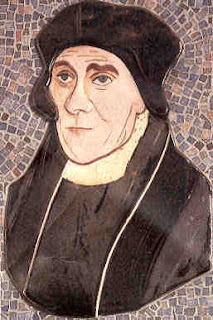Today we continue our regular series here at The Thin Veil called “Learning from the Saints”. Our guide is saint-expert Bert Ghezzi, a dear friend of mine and the author of numerous books including Voices of the Saints, Saints at Heart, and Adventures In Daily Prayer.
His newest book is Discover Christ: Developing a Personal Relationship with Jesus. You can learn more about Bert and his work at www.BertGhezzi.com.
Today, Bert explores the life of St. John Fisher, who is especially relevant today in the midst of threats to religious liberty and individual conscience.
We associate John Fisher with Thomas More, his good friend, and we remember them together. Both were Christian humanists, concerned for serious study of Scripture and the Fathers and the reform of the Church. As a young Renaissance king, Henry VIII had loved and admired them both. But in the end, when integrity and faith compelled Fisher and More to stand against him, the king had his old friends beheaded.
We know More better than Fisher. Historians say that’s because Fisher left us fewer bon mots and anecdotes than his witty friend. The personal note most often reported about Fisher is that he kept a skull at his dinner table to remind him of imminent death.
In 1504, John Fisher became chancellor of Cambridge University and was also appointed Bishop of Rochester, England’s smallest diocese. With the support of Lady Margaret Beaufort, mother of Henry VII, Fisher revitalized Cambridge, founding new colleges and developing the library. And regarding Fisher’s pastoral care for his diocese, Henry VIII boasted that no other prince had so distinguished a prelate as the Bishop of Rochester.
But Fisher became Henry’s most eloquent and determined opponent when the king was contemplating divorce and asserting himself as head of the church of England. Finally in 1535, Fisher refused to take the oath of succession because it affirmed the king’s supremacy over the Church.
Henry had him arrested and imprisoned. The pope sent him a cardinal’s hat, but the king swore he would remove Fisher’s head before he could wear it. At a farce of a trial he was convicted of high treason and condemned to death. Once sentence was handed down, John Fisher boldly stated his opinion:
“My lords, I am here condemned before you of high treason, for denial of the king’s supremacy over the church of England. But by what order of justice I leave to God who is searcher of both of the king’s majesty’s conscience and yours. Nevertheless, being found guilty as it is termed, I am and must be contented with all that God shall send, to whose will I wholly refer and submit myself.
“And now to tell you more plainly my mind touching this matter of the king’s supremacy: I think, indeed, and always have thought, and do now lastly affirm, that his grace cannot justly claim any such supremacy over the church of God as he now takes upon him. Never has it been seen nor heard of that any temporal prince before his days has presumed to that dignity.
So, if the king will now adventure himself in proceeding in this strange and unwonted case, no doubt but he shall deeply incur the displeasure of Almighty God. And this to the great danger of his own soul and of many others, and to the utter ruin of this realm committed to his charge. Because of this, some sharp punishment will come from God’s hand. Thus, I pray God that his grace may remember himself in time and hearken to good counsel for the preservation of himself and his realm, and the quietness of all Christendom.”
On his way to execution, John Fisher opened his little New Testament, looking for a word of comfort. Appropriately, his eyes fell upon John 17, verses 3-4:
“And eternal life is this: to know you the only true God, and Jesus Christ whom you have sent. I have glorified you on earth by finishing the work that you gave me to do” (NJB)
John Fisher was beheaded on June 22, 1535, just a few days before Thomas More.
Like the proprietor of The Thin Veil, John Fisher was a bibliophile throughout his life. “Books were his one earthly pleasure,” says Butler’s Lives, “and he built up one of the finest libraries in Europe with a view to bequeathing it to the University of Cambridge.” Butler’s also reports that the saint ate very little. I suspect like Erasmus, when he had money, he bought books first, then food.
(Image Credit: St. John Fisher Catholic Church)
Read more from Bert at his website www.BertGhezzi.com, or check out his many books on Amazon.
 |
 |
 |


